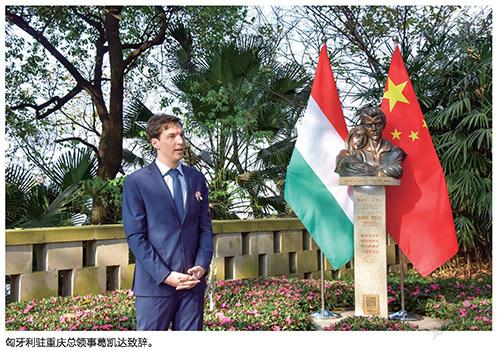Chongqing Resounded with Pet?fi’s Liberty and Love in Spring裴多菲《自由与爱情》回响在山城的春天
2022-04-23刘丁睿
刘丁睿



“Liberty and love. These two I must have. For my love, Ill sacrifice my life. For liberty, Ill sacrifice my love.” This globally well-known poem, Liberty and Love, has a history of more than one century. It is reminiscent of its author, Sándor Pet?fi, a renowned patriotic poet from Hungary.
March ushers in spring, celebrating the rebirth of nature. On March 15th, Hungarian Consulate-General in Chongqing held the memorial ceremony of the “174th Anniversary of Hungarian Revolution and War of Independence of 1848-1849” in Eling Park and shared the love story between the renowned poet Sándor Pet?fi and his spouse Júlia Szendrey. Tang Wen, Level-I Inspector of the Foreign Affairs Office of Chongqing Municipal Peoples Government, was invited to attend the event and presented a wreath for the sculpture of Pet?fi and his spouse Júlia, together with Gergely Kádár, the Consul-General of Hungary in Chongqing. Officials from Consulates-General of the Philippines, Japan, the United Kingdom, Canada, Uruguay and other countries in Chongqing attended the event.
In his remarks, Gergely Kádár introduced the love story between Pet?fi and his spouse Júlia as well as the sculpture, and shared the stories of their forefathers who sacrificed their lives for the liberation during Hungarian Revolution and War of Independence.
Sándor Pet?fi, the 19th-century Hungarian patriotic poet, hero, founder of the national literature, revolutionary and patriotic fighter, is a pioneering figure of his generation to fight for the liberation of Hungary. Pet?fi contributed a lot to poetry, especially the lyric poetry. Apart from producing many poems for revolution, he wrote political commentaries, plays, novels, proses and other literary works. In his life, Pet?fi accomplished about 1,000 lyric and 8 long narrative poems, among which John the Valiant and The Apostle have become classics. Pet?fi had a major influence on the Hungarian literature and encouraged many Hungarian people through his political commentaries.
At the age of 23, Pet?fi fell in love at first sight with Júlia. In the following half a year, Pet?fi accomplished You Like Spring and many other love poems. One year later, encouraged by those affectionate words, Júlia finally married to Pet?fi despite the opposition from her father and family. Amid the growing uprising in Europe at that time, Pet?fi wrote the famous poem, Liberty and Love. In the context of national crisis, Pet?fi participated in the armed uprising in Hungary. During the fight, he was armed with both sabre and quill pen. Finally, Pet?fi gave his life for liberation at the age of 26.
In China, Chongqing is the only city to have the sculpture of poet Pet?fi and his spouse Júlia. The two-meter-high bronze sculpture has two parts. The upper part by a Hungarian sculptor portrays the embrace of poet Pet?fi and his spouse Júlia, while the rest part by a Chinese artist is a square column. This sculpture was officially unveiled in Eling Park in November 2019. Serving as a bridge for people in Chongqing to understand poet Pet?fi and the Hungarian culture and history, the sculpture reflects the friendship between Chongqing and Hungary.
Further Reading
In 1991, Hungary set March 15th as its National Day. On that day, there will be a flag raising ceremony in Kossuth Square in front of the parliament building. President would attend to review the performance of the guard of honor and Prime Minister would deliver an address. In Parliament, the highest-level national cultural and artistic events would be held. For the sculptures of patriotic soldiers and poet Pet?fi, a floral offering will be made.
The Hungarians throughout and outside of the country will gather to hold commemorative events for the National Day. Each year on that day, the Hungarian people will wear a cockade with the national colors of red, white and green, as a way to show their national pride.
“生命诚可贵,爱情价更高,若为自由故,两者皆可抛。”提起这首百多年来在全世界广为传颂的诗篇《自由与爱情》,便会想起它的作者—匈牙利著名爱国诗人裴多菲。
3月15日,春回大地,万物复苏。匈牙利驻重庆总领事馆在鹅岭公园举行“匈牙利1848—1849年革命及独立战争174周年”纪念活动,讲述著名诗人裴多菲与爱人茱莉亚的爱情故事。市政府外办一级巡视员唐文受邀出席,并与匈牙利驻重庆总领事葛凯达一起为裴多菲·山道尔及爱人森黛丽·茱莉亚雕塑敬献花环。菲律宾、日本、英国、加拿大、乌拉圭等国驻渝领事官员出席活动。
葛凯达在致辞中介绍了裴多菲与爱人茱莉亚之间的爱情故事及二人的雕塑,并分享在匈牙利革命及独立战争时期,匈牙利的先烈们为了民族解放而不惜牺牲生命的故事。
裴多菲是19世纪匈牙利爱国诗人、英雄和民族文学的奠基人、革命民主主义者、爱国主义战士,被誉为“匈牙利自由的第一个吼声”。其贡献主要是在诗歌创作方面,尤其是在抒情诗方面,除创作大量革命诗歌外,还写有政论、戏剧、小说和散文等多种体裁作品,他一生中写了约1000首抒情诗和8部叙事长诗,其中最著名的有《雅诺什勇士》和《使徒》,对匈牙利文学的发展具有重大影响,他的政论文章鼓舞了人民。
23岁的裴多菲与伯爵的女儿茱莉亚一见倾心,在半年时间里写出了《你爱的是春天》等许多情诗。这些饱含深情的文字,最终鼓舞了茱莉亚冲破家庭的束缚,在一年后同裴多菲走进婚礼的殿堂。恰在此时,欧洲大地涌起人民起义的革命洪流,裴多菲写下了著名箴言诗《自由与爱情》。民族危难时刻,他参与了匈牙利的武装起义,在战斗中,裴多菲以诗歌为武器,手持战刀和羽毛笔,壮烈牺牲于疆场,年仅26岁。
在中国,仅重庆有裴多菲及爱人茱莉亚的双人雕塑。其高2米,为青铜材质,分为上下两个部分。其中上半部分是裴多菲夫妇的头像雕塑,由匈牙利艺术家制作;下半部分是雕塑立柱,刻有《自由与爱情》诗,由中国艺术家制作。该雕塑于2019年11月正式落戶鹅岭公园,是重庆市民了解裴多菲、了解匈牙利人文历史的一座民心桥梁,展现了重庆与匈牙利之间的友好情谊。
延伸阅读
1991年,匈牙利国会正式确定3月15日为国家节日。这一天,匈牙利官方的主要活动为在国会大厦前科苏特广场举行升国旗和总统检阅仪仗队仪式,匈牙利总理在公共集会上发表讲话,在国会大厦内举行国家最高的文化和艺术仪式,以及向卫国军人塑像和裴多菲像献花等。
匈牙利全国以及匈牙利周边国家的匈牙利族,甚至海外匈牙利人聚居的地方也要举行纪念活动。这一天,匈牙利人会纷纷戴上与国旗颜色相同的红白绿布条扎成的胸章,表达爱国之情。
杂志排行
重庆与世界的其它文章
- State Councilor and Foreign Minister Wang Yi and Myanmar’s Foreign Minister U Wunna Maung Lwin Inaugurating the Consulate-General of Myanmar in Chongqing国务委员兼外长王毅与缅甸外长温纳貌伦共同为缅甸驻重庆总领事馆揭牌
- 从重庆出发,国际联运班列飞驰在陆海贸易新通道
- 国务委员兼外长王毅与缅甸外长温纳貌伦共同为缅甸驻重庆总领事馆揭牌
- “区县班列”驶上西部陆海新通道直达东南亚
- 从“夯基垒台”到“积厚成势”重庆自贸试验区5周年筑牢开放新高地
- 裴多菲《自由与爱情》回响在山城的春天
